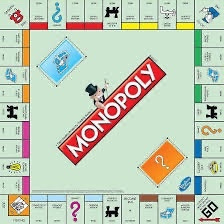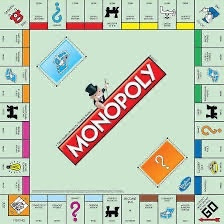When I was in grad school at Purdue1 over 45 years ago, I was in a conversation with colleagues. One had complained that teaching Intro to Soc was harder because we didn’t have all the great illustrations available in Physics or Chemistry2.
I suggested that we could make use of the Monopoly game that students knew so well. What we needed to do was build some structural inequality into the otherwise meritocratic game. So we got to work.
We divided a class of students into four groups: Lower Class, Working Class, Middle Class, and Upper Class. The “rules” we came up with were pretty draconian. The Lower Class could only buy properties on the bottom side of the board, excluding railroads. The Working Class could buy any properties on the bottom and left side of the board above, excluding railroads and the Electric Company. The Middle Class could buy any properties on the first three sides, including railroads and utilities. The Upper Class could buy any property.
We created differing rules for going to jail. The Lower Class had to role double to get out, eliminating the opportunity to pay a fine. The Working and Middle Classes played as normal. If the Upper Class had to go to jail, they first rolled the dice. If the number rolled was seven or greater, they didn’t have to go.3
There were differential salaries for passing go. Otherwise, standard Monopoly rules applied (landing on GO gets twice your salary, owning an undeveloped monopoly doubles the rent charged).
The rules were explained to all students. Once they understood the limitations and opportunities, they rolled dice to see who was in which social class.4
I played the game in class for years.5 The results were fairly predictable. The Lower Class developed a strategy of simple survival. The Working Class did what they could but were frustrated at not being able to get ahead. The Middle Class thought they were really competing and had a chance of winning. The Upper Class got lackadaisical and figured they could do whatever they wanted.
The takeaway lesson was that this wasn’t one game but four. Each group had a different reality defined by the inequity of the rules themselves.
The modified Monopoly game came to mind when reading about two recent laws passed by state legislators. Alabama passed an anti-DEI bill that banned the teaching of “divisive comments”. The governor explained:
“My administration has and will continue to value Alabama’s rich diversity, however, I refuse to allow a few bad actors on college campuses—or wherever else for that matter—to go under the acronym of DEI, using taxpayer funds, to push their liberal political movement counter to what the majority of Alabamians believe,” Governor Kay Ivey, a Republican, said in a statement. “Supporting academic freedom, embracing diversity of cultures and backgrounds and treating people fairly are all key components of what we believe in Alabama, and I am more than confident that will continue.”
NPR reports like this:
The new Alabama legislation lists eight "divisive concepts" that range from the idea that "any race, color, religion, sex, ethnicity, or national origin is inherently superior or inferior" to the notion that "any individual should accept, acknowledge, affirm, or assent to a sense of guilt, complicity, or a need to apologize on the basis of his or her race, color, religion, sex, ethnicity, or national origin."
While technically social class isn’t in the initial list of divisive comments, that second phrase about “affirming or assenting” comes close. Could a student complain that I’m making them feel bad for being rich?
Meanwhile, my home state of Indiana went even further. A week ago, the governor signed a bill requiring “intellectual diversity”. Inside Higher Ed explained:
Further, colleges and universities will have to consider “intellectual diversity” and other related criteria—including whether the faculty member “introduced students to scholarly works from a variety of political or ideological frameworks that may exist within the curricula”—when deciding whether to give bonuses or renew faculty members’ contracts. That means the law will impact nontenured faculty members, too.
Would my modified Monopoly game run afoul of watchdogs in Indiana? Would I be required to have my students read Thomas Sowell or Charles Murray to “balance” the structural inequality that is central to a sociological understanding?
It’s possible that I’m worrying too much about this (I’m retired, after all). There was good news out of Florida (surprising!) this month when the 11th Circuit of the Court of Appeals brokered a settlement around the “Don’t Say Gay” bill. It clarified
The settlement says that students and teachers are allowed to talk about sexual identity and gender orientation in public schools, as long as it is not part of formal classroom instruction.
This is good news. Maybe the courts will find ways of defanging the legislation in Alabama and Indiana. I’m not holding my breath, but one can hope.
Boiler UP!
Shoutout to my friend Tom Kuntzleman: https://www.youtube.com/channel/UC6rrBCCDvrDFcOJHifruL5A
An example that has been very much in the news lately.
Something like John Rawl’s “veil of innocence”
If you teach Intro to Soc, feel free to steal this!





I love the idea!
It would probably be even better if you assigned any upper class students to the bottom rung and assigned the lower class to the upper. Might be eye-opening.
James
My go to illustration for the problem of these divisive concept law is that here in GA the law says you can’t teach that the US is structurally racist. 8th grade standards require the teaching of the Dred Scott decision. As I have discussed it locally most of the time I ask people about how they would teach Dred Scott and almost universally supporters of the law do not understand what the decision was.
The same law says that teachers can’t be forced to do teacher training on DEI subjects. But our district has 80% white teachers and 39% white students.
And last night our local school board removed the word equitable from the board policy on school funding. So the official school board policy no longer says that there is a goal to fund all schools equitably.
Teachers certification goals also no longer have a goal of teachers teaching all students equitably.
I really do not think people are trying to be inequitably in teaching or funding. And when I have talked to people about whether all of history should be taught, they think that it should be.
But the removal of the goals is a problem because if it isn’t a goal, it isn’t going to be evaluated.
Years ago in when I was in chicago the parks department said that it had a goal of equitably funding parks around the city. But they had opaque reports and it was hard to analyze. Someone got a grant and put in a ton of time to evaluate and what most people knew was true. It was very inequitable.
Mt current school board is going to be changed in the not too distant future. The board maps have been thrown out. The new maps will be updated eventually. The board will flip control. But not every place will change.